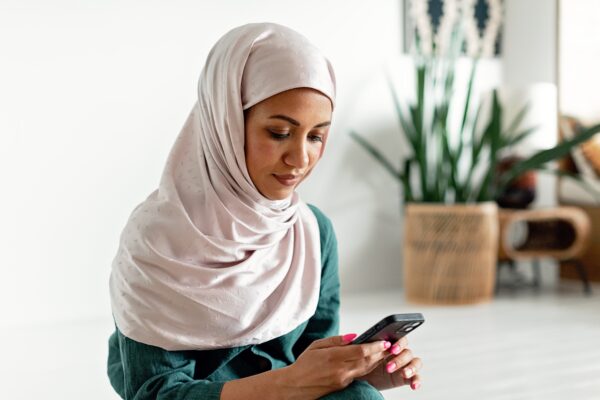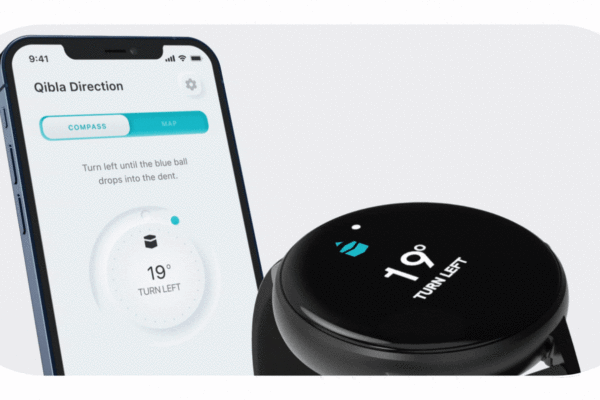“It was one of those things where I thought, does anyone else actually care, but it was so nice to see that people actually did and understood our point of view that products by the Muslim community shouldn’t be controlled by anyone else. It should be built within the Muslim community and we should try and service our own communities.”
“It was one of those things where I thought, does anyone else actually care, but it was so nice to see that people actually did and understood our point of view that products by the Muslim community shouldn’t be controlled by anyone else. It should be built within the Muslim community and we should try and service our own communities.”
Here at TMV, we’ve always been interested in exploring the newest (and most popular) Muslim-created digital apps that are affecting the Muslim community across the globe. In one of our previous episodes of Being Muslim, we in fact dedicated an entire mini-documentary to the rise of Muslim “dating apps” – in where we first interviewed Shahzad Younas, who is the CEO and founder of Muzmatch.
Muzmatch remains one of the most popular Muslim-created apps for Muslims to find a partner for marriage, and as Shahzad explained to us, if he could explain what Muzmatch does in one sentence it would be an app that helps “two Muslims getting to know each other, with the end goal of getting married”.
Alongside numerous perks like privacy settings that you can control, the option of having a chaperone when conversing with someone new, and extensive security around who can create a profile in order to make sure the platform remains a safe environment, Muzmatch remains one of the leading apps where Muslims can seriously look for a spouse for marriage outside of other traditional avenues for finding a partner.
During our interview with Shahzad at the time, we had posed this question to him: “Muzmatch, in the past, has often been compared to Tinder a lot – do you feel this is a fair comparison or do you not like to be associated with something like Twitter?”
Shahzad had quickly responded with: “Sometimes journalists will call us the ‘Muslim Tinder’ – and I get it, because for a non-Muslim it is the easiest way for them to understand Muzmatch by comparing it to Tinder – but then if you actually understood the Muslim sensitivities around Muslim ‘dating’ and the intent of Muslims who are using apps like this, I think that’s where it can be problematic.”
He explained that while comparisons to Tinder and other non-Muslim dating apps were commonplace for Muzmatch, it was – in his opinion – just an easy way for journalists or articles to describe Muzmatch to the wider public. Muzmatch is not, in fact, about dating or casual relationships like Tinder, but a serious platform where Muslims can find a spouse for marriage.
Here’s our previous episode on Muslim dating apps, and our interview with Shahzad three years ago:
And this is where we now come back to Shahzad for a second interview – in the past few weeks, it became public knowledge that Muzmatch was being sued by Match Group, the powerhouse behind apps like Tinder and Hinge, who has accused Muzmatch of “trademark infringement”. Muzmatch has denied all accusations and has been defiant in defending itself against these claims.
With the court trial happening on the 18th of January, it now remains to be seen what the decision will be, and what the next steps for Muzmatch will entail. During the trial’s three-hour cross-examination, Shahzad was questioned on everything from whether he had heard of Match Group (or match.com) before creating Muzmatch to the definition of “Western” versus “modern” terminology to describe Muzmatch’s services provided for the Muslim community.
The @muzmatch trial vs Match Group took place at the High Court in London, UK last week.For background on the case check the tweet below.
Judge Caddick QC will submit his judgement in 6 weeks.
During the trial I was cross examined for nearly 3 hours.
What happened? A thread.. https://t.co/USPB482ezP
— Shahzad Younas (@ShahzadYounas_) January 28, 2022
To understand more in-depth about what happened and what his personal reflections are on this entire experience, we asked Shahzad a few questions about it all.
TMV: Salaam and thanks so much for sitting down with us post-trial – this is a huge story and we’re really thankful you’re taking the time out to speak with us. So I guess first things first – can you explain in simple terms what exactly happened for those of us who don’t know?
Shahzad: In essence, the heart of it is that Match Group – who own match.com, Tinder, and about 50 other dating apps – objected to the use of the word “match” in Muzmatch and they’re saying that we’re riding on their reputation, and have taken advantage of being linked to match.com. Which was and is completely wrong.
We’ve never wanted to be associated with match.com or with Match Group, we’ve always wanted to be distinct, and for us, the use of the word “match” in Muzmatch is just about matchmaking. We match Muslims, that’s what we do. And we’re simply using the English word “match” in describing how we match people together.
That’s the heart of the case. But if you look at the wider story around it, I don’t think it’s just as simple as that. From my perspective, if you look at the timeline of how Match Group has interacted with us, objecting to various trademarks, trying to acquire us, making different offers for us, us saying no to all of this, then them buying a competitor, and then suing us here – and then shortly afterward suing us in the US – this is clearly, in my eyes, a cynical way for a large, global corporation to try and exert pressure on what is a small start-up. I find a lot of this litigation very cynical – for a big company it’s very trivial but for a small company it’s actually a very big deal.
What were your initial feelings and thoughts when this became a reality? And what was the general reaction from the team at Muzmatch?
I’ve been very transparent with my team about this whole thing, about the case, how it evolved, our thoughts on it, and our preparation on it – we’ve been preparing for this case for one and a half years, I’ve spent an obscene amount of hours reading, preparing, and getting evidence all in order, going through data, finding various documents and working with the lawyers – and it’s been an exhausting process and it’s definitely detracted from my work, working on the product and working with the team.
The team overall, they all can’t quite understand it in that – it’s the English word “match”, how can a big company own the English language? And that’s basically how the team sees it as well. I think they have the same kind of cynical view to this that I have – obviously, they’ll be a bit biased because they’re a part of Muzmatch, but generally speaking, that was their thoughts.
My personal thoughts initially were that this didn’t surprise me at all. If you look at Match Group and a lot of their tactics, they litigate heavily, this is just a tactic for them. If you look at the story with Bumble, they tried to acquire Bumble twice, failed, and then sued them over the use of the swipe gesture in the app. In the end, it went on for x years and in the end, Bumble and Match Group settled. Bumble is a huge company and has a lot more money than we do – but I think there are a lot of parallels there.
It makes me anxious when this kind of thing happens because it’s a big deal, it affects your business, especially if you lose, which would mean the death of the Muzmatch brand, which is something we built up over 11 years. In all of our evidence and in the case itself, we said look, there are no examples of confusion, no one is confused and thinks Muzmatch is part of match.com – there is just no evidence that points towards that.
For me, I see this whole thing as very unnecessary, I actually think and prefer that companies should compete fairly and not go down this road of needless litigation – but it is what it is. For some companies, that’s a business tactic and that’s what they’ve decided to do.
There are so many people using Muzmatch, I personally have a lot of friends who use it as well, which means that a lot of rumors and knee-jerk reactions must have been flying around from the general Muslim community about this. How did you decide to address this issue publically and why did you feel it was important to do so?
I contemplated, actually, being a lot more public about this, but our lawyers kind of advised that look, for now, keep it to yourselves until the trial and ideally until judgment. But then I think The Times reported – because they got a record of the filing that there was going to be a court case with Match Group versus Muzmatch – so they reached out for comment, and they just put a story out that Match Group is suing us. And when they sued us in the US, quite a few journalists picked up on the same thing that there was a lawsuit – because that’s a public document.
So then I have friends messaging me, and customers messaging me asking what’s going on, what does this mean for my account, what does this mean for my data, and that’s when I thought actually, we should just be very transparent and tell people the whole story. There were certain bits that were previously under NDA, which aren’t anymore, and I tried in my explanation to be as factual as possible. So in my Twitter thread and in the email we sent out, it was, as much as possible, a factual explanation.
The goal was to educate everyone on the backstory so that they can put some context to this, so that people can be informed and that they can see what’s going on. For me, it was crucial that we did this before any judgment was made. Let’s say a judgment came against us, for us to appear then bitter afterward – I’d much rather have us be able to say this is what happened, there is a trial, and we wait for judgment. I think that’s a much fairer way.
And at Muzmatch, we try to be very close to our community, so we make ourselves very available to our community, we talk to them every day. And so for us, this was just another part of that journey, of us saying what’s happening and what it means for them. That’s why it was so important for us to be direct and transparent.
I’ll have to say, I was amazed at the positive, genuine thoughts and duas that people were making for us. So many people messaged me just saying something like “thinking about you guys” – it was genuinely just really heartwarming. It was one of those things where I thought, does anyone else actually care, but it was so nice to see that people actually did and understood our point of view that products by the Muslim community shouldn’t be controlled by anyone else. It should be built within the Muslim community and we should try and service our own communities. I think that’s really important, and I was glad to see that other people felt the same way.
In your opinion, does this trial represent something bigger than just an attack on Muzmatch?
I see this as a cynical attempt of a big corporate trying to shut down the only legitimate competition in this space. You know, we’re the biggest in the world for Muslim marriage, and we’ve gone through our shared hard work over the last few years and as an app, over the last six and a half years. No doubt we’re the market leader, and I think if the biggest dating app in the world buys a competitor and then tries to shut down all the other legitimate competitors, I think you have to see it for what it is.
And I was amazed at the number of different companies who, off the record, have reached out to me saying that they are either in, or have had litigation from that same group over their name or some other aspect of their app. So this is a very, very well-worn tactic by Match Group. For me, the principle was strong enough – we’re an 11-year-old brand, we’ve run our business in a very honest fashion, we never sought to or wanted to be confused with match.com – and for me, that was worthwhile defending. Our brand is so well-known within our community, so I felt that it was crucial that we don’t just back down and give up – we have to fight, and that’s what we do.
Moving forward post-trial, what are the next steps (if you can talk about it)? And what does this mean for the future of Muzmatch?
I’m slightly limited as to what I can say now, but in short, I always say that I think of everything as an opportunity, both good and bad. So if something good happens, great, but if something bad happens, then I think ok fine – how can we make something good happen out of something bad? For me it’s the same, whatever happens with this court case, I know that we’ve prepared our case as thoroughly as possible, we put a strong case forward, we were well organized, and we defended ourselves really well. And I have to admit, all the hard work we put in definitely paid off – we had a solid, well-presented case that we put forward, and so the one thing that allows me to sleep at night is knowing that we got no regrets. We literally put everything into it.
So whatever happens, if we win, nothing changes, we just carry on as normal but we just wasted a million pounds, if we lose, then we’ll have to change the name and we’ll have to pay some sort of damages to Match Group. Anyone who knows me knows I’m a fighter and knows I’m a very hardworking guy and with enough determination, we can pull through anything.
We’re also thinking much bigger, we’re working on a whole ton of things that we just can’t wait to announce, but I guess you will just have to wait!
What are some lessons you think are essential for other Muslim-led startups to know before getting started that you’ve personally learned?
A, listen to your customers. B, respect the customer. C, always improve your product. For us, we’ve embraced the quirks of how Muslims find a partner, we don’t try and shoo them all into a corner. The whole premise of the court case was look, Muslims don’t use mainstream services on the whole because they don’t service their need which is to need to find a Muslim partner for the sake of marriage. Unashamedly, that’s what we’re about. We want to help Muslims find a life partner, to get married. We’re not about casual dating, we’re not about hookups or all of that stuff – if you want that, go somewhere else. We’re unashamedly trying to understand our customers, service our customers, and create products and features for our customers.
One thing that has always been a principle for me is also to have a really high bar. From personal experience I’ve noticed that unfortunately a lot of Muslim products are generally average or of poor quality, be it tech or otherwise. For me, from day one, I was like look, we’re never going to be that. We have to set the bar as high as mainstream apps. All of our customers use Instagram and Snapchat and the likes – they know what a good app is. It was setting the bar to that standard and making sure we hit that. People who use our app literally compare us to the big boys.
If you’re a Muslim start-up, let’s aim really really high, let’s up the level of quality, customer experience for the Muslim consumer – that’s how we grow as a Muslim community.





